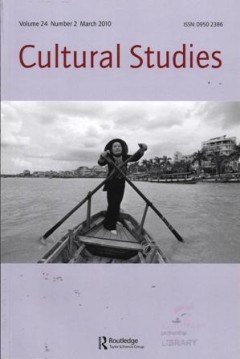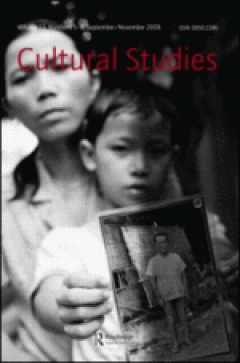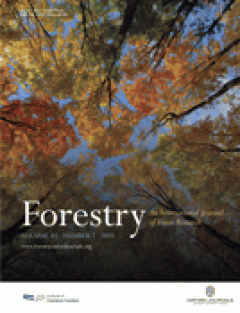Filter by

SUSPECTS IN THE CITY: Browning the 'not-quite' Canadian citizen
This essay explores the circulation of fear and suspicion in Toronto and Montreal during perceived national security crises, which in recent years have been heavily influenced by post-9/11 US events, discourses and legal acts. It discusses how non-status residents and 'Canadian-born brown' residents have both become the focus of suspicion and intensified their own suspicion of fellow residents …
- Edition
- Volume 24, Issue 2 March 2010 , pages 200 - 213
- ISBN/ISSN
- 09502386
- Collation
- -
- Series Title
- Cultural Studies
- Call Number
- -

TINGS BROWN!: Nationalists, regionalists and tourists making claims on the state
In Barbados economic hardship has a color. Ask Barbadians 'how're you doing?' and, if things are difficult in any way they might answer, 'Tings brown!' This seems to be an especially appropriate phrase for this paper which explores the inter-relations between contemporary racialized identificatory strategies and economic hardship in the Caribbean. My interest is in exploring the challenges Cari…
- Edition
- Volume 24, Issue 2 March 2010 , pages 214 - 233
- ISBN/ISSN
- 09502386
- Collation
- -
- Series Title
- Cultural Studies
- Call Number
- -

475° FROM SEPTEMBER 11: Citizenship, immigration, same-sex marriage, and the…
Under US leadership, political structures in the post-9/11 world have developed and deployed rhetorical techniques aimed at identifying, excluding, and prosecuting specific bodies. In this paper, we analyze governmental and cultural rhetoric in the United States during 2006 on the issues of immigration (including immigration policies and proposed reform) and same-sex marriage (including bans to…
- Edition
- Volume 24, Issue 2 March 2010 , pages 234 - 255
- ISBN/ISSN
- 09502386
- Collation
- -
- Series Title
- Cultural Studies
- Call Number
- -

ISLAMOPHOBIA, CULTURE AND RACE IN THE AGE OF EMPIRE
This paper offers a genealogical sketch of the figure of the Muslim Other as it is figured in the post-Cold War popular and political imaginary. It explores why 'culture' has acquired a putative explanatory power in the post-Cold War (geo)politics. In addressing differentialist racism, it posits Islamophobia as an ideological response that conflates histories, politics, societies and cultures o…
- Edition
- Volume 24, Issue 2 March 2010 , pages 256 - 275
- ISBN/ISSN
- 09502386
- Collation
- -
- Series Title
- Cultural Studies
- Call Number
- -

LATIN AMERICA AT A CROSSROADS: Alternative modernizations, post-liberalism, o…
This paper examines the socio-economic, political, and cultural transformations that have been taking place in South America during the past ten years, particularly in Ecuador, Venezuela, and Bolivia. Whereas at the level of the states the transformations do not seem to venture beyond alternative forms of modernization, the discourses and strategies of some social movements suggest radical poss…
- Edition
- Volume 24, Issue 1 January 2010 , pages 1 - 65
- ISBN/ISSN
- 09502386
- Collation
- -
- Series Title
- Cultural Studies
- Call Number
- -

PERFORMING SOMALI IDENTITY IN THE DIASPORA: 'Wherever I go I know who I am'
Somali refugees who fled the collapse of their homeland and resettled in the US narrate 'who they are' within a bewildering entanglement of cultural differences layered with diasporic tensions. This analysis examines the storytelling of a young woman refugee to Lewiston, Maine, who embodies the performative tensions that animate Somali identity at this intense historical moment and in this dens…
- Edition
- Volume 24, Issue 1 January 2010 , pages 66 - 94
- ISBN/ISSN
- 09502386
- Collation
- -
- Series Title
- Cultural Studies
- Call Number
- -

CHOOSING USING: Drug policy, consumer culture and 'junkie' manquees
This article investigates the shaping of contemporary drug-using (and non-drug-using) subjectivities through operations of choice and consumption. Examining various registers of 'possession,' it argues that in the construction of both docile and irredeemably flawed consumers, 'choice' (and its negation) is pivotal. Exploring motifs of choice, possession and pleasure in the operations of 'normal…
- Edition
- Volume 24, Issue 1 January 2010 , pages 95 - 109
- ISBN/ISSN
- 09502386
- Collation
- -
- Series Title
- Cultural Studies
- Call Number
- -

REPRODUCING REGIMES OF IMPUNITY: Fake encounters and the informalization of e…
In India, the phrase 'fake encounter' refers to the extrajudicial killing of a civilian followed by the official claim that the victim was a Pakistani infiltrator killed in a legitimate military encounter with police or army forces. This article explores the widespread pattern of fake encounters in Kashmir Valley in order to shed light on the processes through which violence and terror become f…
- Edition
- Volume 24, Issue 1 January 2010 , pages 110 - 132
- ISBN/ISSN
- 09502386
- Collation
- -
- Series Title
- Cultural Studies
- Call Number
- -

PRIMITIVE ACCUMULATION, EMINENT DOMAIN, AND THE CONTRADICTIONS OF NEO-LIBERALISM
One of the distinguishing characteristics of neo-liberal capitalism, as Paul Smith has argued, is the prominent role played by primitive accumulation - that is, the process through which social resources currently outside the circuit of capital are expropriated, often by the state, and thrust into circulation. The persistence of primitive forms of accumulation raises an important contradiction …
- Edition
- Volume 24, Issue 1 January 2010 , pages 133 - 160
- ISBN/ISSN
- 09502386
- Collation
- -
- Series Title
- Cultural Studies
- Call Number
- -

POST-COLONIAL REFLECTIONS ON THE 'INTERNATIONALIZATION' OF CULTURAL STUDIES
This essay addresses the difficult politics of 'internationalizing' cultural studies. In an effort to participate in ongoing conversations about, and around, 'internationalizing' cultural studies, this essay invites us to attend to the frames of reference that can sometimes underlie our efforts at 'internationalizing' cultural studies. Examining larger issues such as our frequent unexamined poi…
- Edition
- Volume 23, Issue 5 & 6 September 2009 , pages 694
- ISBN/ISSN
- 09502386
- Collation
- -
- Series Title
- Cultural Studies
- Call Number
- -

HIGHER EDUCATION 'REFORM', HEGEMONY, AND NEO-COLD WAR IDEOLOGY: Lessons from …
Examining some of the specifics of educational 'reform' in the post-state socialist political landscape, this article argues that the reproduction of Western hegemony in Eastern Europe and within the academic global political economy is more complex than we can grasp through idealist critiques of travelling theory and of representations alone. We need to attend to the materiality of hegemony, i…
- Edition
- Volume 23, Issue 5 & 6 September 2009 , pages 720
- ISBN/ISSN
- 09502386
- Collation
- -
- Series Title
- Cultural Studies
- Call Number
- -

INTERPRETING TRANSNATIONAL CULTURAL PRACTICES: Social discourses on a Korean …
This article explores the ways in which East Asian countries approach and understand the transnational flows of Korean cultural products. Specifically, it examines newspaper discourses from Korea, Japan, Hong Kong, and China concerning the high popularity of a transnationalized Korean drama, Dae Jang-geum, across those societies. By adopting a quantitative and qualitative discourse analysis, th…
- Edition
- Volume 23, Issue 5 & 6 September 2009 , pages 736
- ISBN/ISSN
- 09502386
- Collation
- -
- Series Title
- Cultural Studies
- Call Number
- -

NEGOTIATING A COMMON TRANSNATIONAL SPACE: Mapping performance in Jamaican Dan…
At the interstices of cultural geography and performance studies, this article continues the author's earlier research and writing on Jamaica's Dancehall culture, and analyzes the applicability of insights gained to other black performance genres, most notably South African Kwaito. Through research methods including interviews and participant observation, a comparative perspective on Dancehall …
- Edition
- Volume 23, Issue 5 & 6 September 2009 , pages 756
- ISBN/ISSN
- 09502386
- Collation
- -
- Series Title
- Cultural Studies
- Call Number
- -

BEYOND ETHNICITY, INTO EQUALITY: Re-thinking hybridity and transnationalism i…
- Edition
- Volume 23, Issue 5 & 6 September 2009 , pages 775
- ISBN/ISSN
- 09502386
- Collation
- -
- Series Title
- Cultural Studies
- Call Number
- -
- Edition
- Volume 23, Issue 5 & 6 September 2009 , pages 775
- ISBN/ISSN
- 09502386
- Collation
- -
- Series Title
- Cultural Studies
- Call Number
- -

TRANSLATING THE TRANSNATIONAL: Teaching the 'Other' in translation
This article is concerned with the uneven landscape of cultural flows across the global south and north. By examining geo-political hierarchies in the production of knowledge through translation and teaching, the article raises questions about the shortcomings of the term, 'transnational' as it is employed in post-colonial and cultural studies today. Reception of Middle Eastern cultural texts w…
- Edition
- Volume 23, Issue 5 & 6 September 2009 , pages 795
- ISBN/ISSN
- 09502386
- Collation
- -
- Series Title
- Cultural Studies
- Call Number
- -

TRANSGEOGRAPHICAL PRACTICES OF MARRONAGE IN SOME AFRICAN FILMS: Peck, Sissako…
In this article, I mobilize the notion of 'marronage' to analyze the ways in which specific practices of representation allow us to observe transgeographical practices of expression in the films of Raoul Peck, Abderrahmane Sissako, and Jean-Marie Teacuteno. I suggest that the works of these three filmmakers are not relational and do not attempt to recuperate colonial and imperial experience in …
- Edition
- Volume 23, Issue 5 & 6 September 2009 , pages 810
- ISBN/ISSN
- 09502386
- Collation
- -
- Series Title
- Cultural Studies
- Call Number
- -

FROM CULTURAL STUDIES TO TUDES CULTURELLES, TUDES DE LA CULTURE, AND SCIENC…
The starting point of our reflexion about the place of Cultural Studies in France and the development of French Cultural Studies lies in a double paradox. The first paradox consists in the absence of any stable terminology and taxonomy, whereas Cultural Studies has already, though implicitly - almost secretly, encroached on the French scientific realm in the shape of very plastic and dynamic fo…
- Edition
- Volume 23, Issue 5 & 6 September 2009 , pages 831
- ISBN/ISSN
- 09502386
- Collation
- -
- Series Title
- Cultural Studies
- Call Number
- -

'A ROOM OF ONE'S OWN'?: Cultural Studies' relationship to institutionalizatio…
The phrase, 'a room of one's own,' coined by Virginia Woolf, refers not only to the physical space necessary for creating art but also to the hitherto ungranted space within the canon for women artists. In an attempt to relate to the dilemma posed by Woolf, my aim in this paper is to assess whether, as a physical site, the Spanish University (its departments and curricula) provides the intellec…
- Edition
- Volume 23, Issue 5 & 6 September 2009 , pages 855
- ISBN/ISSN
- 09502386
- Collation
- -
- Series Title
- Cultural Studies
- Call Number
- -

POLITICAL ONTOLOGY: Cultural Studies without 'cultures'?
In this article I seek to put into conversation two different but convergent intellectual/political projects, Lawrence Grossberg's 'radically contextualist cultural studies' and 'political ontology', an emergent analytical framework being developed by a loosely connected network of scholars. Central to both projects is the question of modernity, but while Grossberg's cultural studies focuses on…
- Edition
- Volume 23, Issue 5 & 6 September 2009 , pages 873
- ISBN/ISSN
- 09502386
- Collation
- -
- Series Title
- Cultural Studies
- Call Number
- -

Deadwood abundance in recently harvested and old Nova Scotia hardwood forests
Deadwood (dead standing tree (snag), woody debris (WD; downed deadwood), buried wood and stump abundance) was estimated in northern hardwood forests of Nova Scotia dominated by Acer saccharum, Betula alleghaniensis, Fagus grandifolia, Betula papyrifera and Acer rubum. Three strata were examined (1) old forests, (2) forests clearcut 1�2 years before measurement and (3) forests clearcut 8 years b…
- Edition
- Volume 83, Number 2, April 2010. Pp. 219-227
- ISBN/ISSN
- 0015752x
- Collation
- -
- Series Title
- Forestry an International Journal of Forest Research
- Call Number
- -
 Computer Science, Information & General Works
Computer Science, Information & General Works  Philosophy & Psychology
Philosophy & Psychology  Religion
Religion  Social Sciences
Social Sciences  Language
Language  Pure Science
Pure Science  Applied Sciences
Applied Sciences  Art & Recreation
Art & Recreation  Literature
Literature  History & Geography
History & Geography